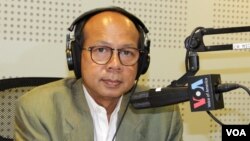Rights groups and other organizations continue to worry about a draft law on NGOs, one that they say is not necessary and could impede their work.
The fear is that the law contains too many loopholes for abuse, so that if it is not implemented properly, it can become a political tool to stop work the government may deem subversive.
“For now, it would be better if there is no such law,” governance expert Ok Serei Sopheak told “Hello VOA” Monday. “There is no urgent need so that it must be released immediately. We have to leave time for more discussion, and to reflect what we’re proud of nowadays, which is the ‘culture of dialogue.’”
Prime Minister Hun Sen announced the postponement of the law in 2011, to leave more time for consensus. But in April, he made a surprise push for its passage, threatening to “handcuff” anyone who did not comply with it once it is put into practice.
That has led to renewed concerns over the law, which requires NGOs to register with the Ministry of Interior or Ministry of Foreign Affairs and to submit financial reports to the government.
Ok Serei Sopheak said the law, if implemented, could create new tension points and rifts between civil society and the government, who already have a turbulent relationship. “So it’s very complicated,” he said. “It’s not easy.”
Some NGOs could become the targets of government crackdowns, he said.
Hun Sen said recently that the government is seeking transparency, not crackdowns. “Foreigners inject their money to fund non-governmental organizations, and we want to know in what areas.”
But Brad Adams, head of the Asia division of Human Rights Watch, said the law is cause for concern.
“Nongovernmental groups in Cambodia have long played a crucial role in providing essential services to the public and holding the government accountable,” he said in a recent statement. “But the threat to ‘handcuff’ those who oppose this law shows an intent to clamp down on groups that criticize human rights abuses, corruption, and other government misdeeds.”
“While Hun Sen claims that he has adopted a new ‘culture of dialogue,’ he has not even been willing to release the draft law so there can be a public debate,” Adams said. “Instead, he has resorted to threats to ram through a law that appears to be aimed at silencing and intimidating critical voices.”




